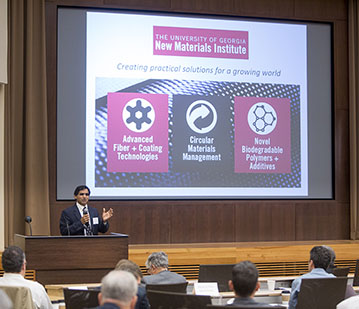AFFOA Day: Fabric Revolution

About 90 leaders from the fabric and textile industry, along with researchers and military officials, discussed the future of fabrics and textiles in the digital era during AFFOA Industry Day at the University of Georgia Oct. 20.
The representatives—half of them from industry—discussed the future of the Advanced Functional Fabrics of America partnership. AFFOA, a public-private partnership launched this spring and funded in part by a $75 million commitment from the U.S. Department of Defense, seeks to accelerate innovation involving fibers and textiles through advances in manufacturing and engineering.
The conference was jointly sponsored by the UGA Office of the Vice President for Research, the College of Family and Consumer Sciences and the College of Engineering.
“The meeting was meant to bridge recent advantages from material science academic labs and the modern manufacturing capabilities of the fiber and textile industry,” said Sergiy Minko, Georgia Power Professor of Polymers, Fibers and Textiles in the College of Family and Consumer Sciences and professor in the Franklin College of Arts and Sciences department of chemistry.
“The event was designed to bring U.S textile and clothing manufacturers to the highest point of modern materials science, with a major goal to create new jobs in this country,” Minko said. “Training and workforce development for the new market was one of the key topics of our discussions.”
“We’re joining with companies large and small, universities and startup incubators from around the U.S. to drive a manufacturing-based revolution by transforming traditional fibers, yarns and fabrics into highly sophisticated systems and devices for both consumer and defense applications,” said Gajanan Bhat, the Georgia Athletic Association Professor of Fibers and Textiles within the FACS department of textiles, merchandising and interiors.
One of the industry speakers was FACS alumna Tosha Hays (pictured above), co-founder of Brrr! Inc., which develops and commercializes textile technologies. The company’s launch material is a cooling technology that lowers skin temperature 2 to 3 degrees F. The company licenses its technology to global brands across multiple consumer categories.
“It was very inspiring having the AFFOA team participate,” Hays said after the event. “Their brilliant minds cause a ripple effect of inspiration to everyone involved.
“The barcode fabric was a tangible result of what this innovation can do—the tip of the iceberg, so to speak,” Hays said.
“The network is key,” she added. “Working together toward one goal with each individual or company contributing their own expertise can make incredible things happen.”
Yoel Fink, AFFOA CEO, introduced AFFOA’s bold mission to the audience. He described AFFOA’s strong industrial support and the broad industry, academic and government coalition that has formed a nationally distributed rapid prototyping foundry. He predicted that, with these resources in place, we would witness “Moore’s law for fibers” – the functionality of fibers increasing dramatically each year.
“In order realize our mission of transforming textile manufacturing into a hi-tech, value-added industry in which the U.S. is the world-wide leader, we are basing our technology and manufacturing roadmaps on intellectual property,” he said. “IP will help us ensure that the advancements we are investing in are manufactured here, to benefit the nation.”
In addition, Fink said, AFFOA is performing the first national modern textile manufacturing workforce needs assessment, and mapping existing workforce training resources across the country in order to match current and future industries’ needs with capabilities through strategic investment.
Among the other speakers who addressed the group was Ramanathan Nagarajan, a senior research scientist with the U.S. Army Natick Soldier Research, Development and Engineering Center, who discussed emerging textile materials for Department of Defense needs.
During lunch, industry representatives and academic researchers got the opportunity for direct interaction at a poster session with 36 posters from UGA, Clemson and others highlighting some of the latest advances in fiber science.
“In addition to providing a forum for technical exchange on potential research collaborations between universities and industry, the poster session was a great opportunity for students to connect directly with industry, get feedback on their work and understand more about industry needs,” said Crystal Leach, director of Discovery and Innovation Partnerships at UGA.
Members of the AFFOA partnership include Fortune 500 companies as well as small and medium-sized companies spanning the electronics, materials, apparel, transportation, fashion, defense, medical and consumer good manufacturing sectors.
It also includes leaders of the fabric industry, such as Inman Mills, and leading research universities MIT, Drexel University and the University of Texas at Austin.
In addition to Minko and Bhat, other UGA researchers who play critical roles in AFFOA include Suraj Sharma, associate professor in the department of textiles, merchandising and interiors in the College of Family and Consumer Sciences, and Jason Locklin, associate professor in the College of Engineering and department of chemistry in the Franklin College of Arts and Sciences.
Researchers from the Complex Carbohydrate Research Center who conduct research on biopolymers also will contribute to research and development of new technical textiles. Innovation Gateway, UGA’s commercialization and startup arm, will be instrumental in bringing new technologies to the market, including a portfolio of 10 existing textile, fiber and polymer technologies.
The AFFOA Industry Day was a part of the College of Family and Consumer Sciences’ FACS Week, the college’s signature event that celebrates communities, academic excellence and the future of families.
